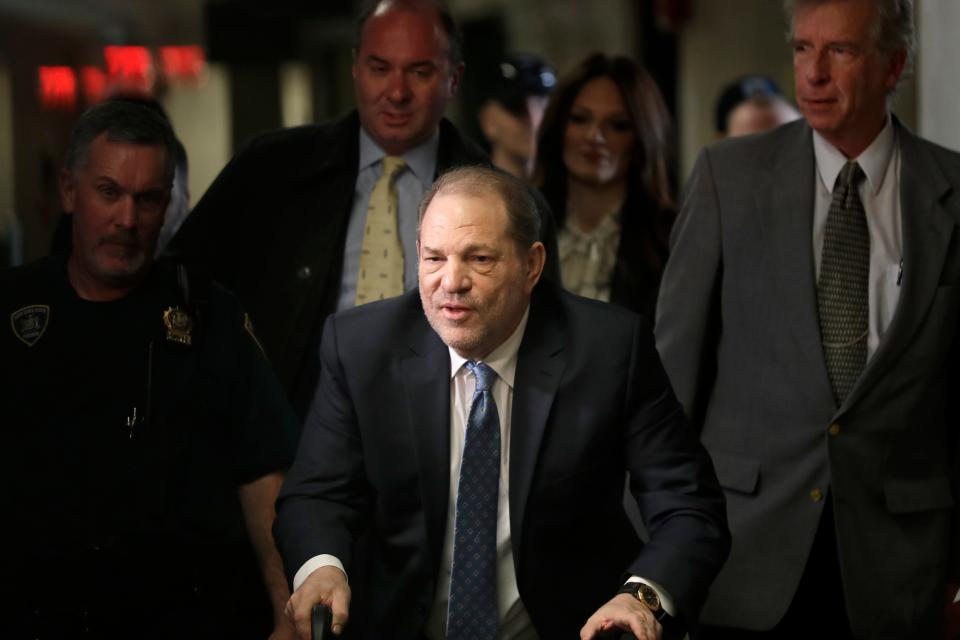Weinstein, Cosby, Kavanaugh: You can put a number on how much these stories matter
This week, the world watched as former film producer Harvey Weinstein was found guilty of two felony sex crimes, delivering a victory to the #MeToo movement his predatory behavior, long kept quiet, helped ignite.
In the days afterward, many women broke their own silence.
The Monday and Tuesday after the verdict was delivered, the National Sexual Assault Hotline experienced a 23% increase in call volume.
"As with other high-profile cases like Bill Cosby's, the media attention surrounding Harvey Weinstein’s case is leading many more survivors to reach out for help – often for the first time," said Erinn Robinson, press secretary for the Rape Abuse & Incest National Network, which operates the hotline.

The hotline's biggest spike – 338% – came after Christine Blasey Ford testified before the Senate Judiciary Committee on allegations that then-Supreme Court nominee Brett Kavanaugh sexually assaulted her, according to RAINN President Scott Berkowitz. It's become a common trend. Calls increased 53% after New York magazine published an excerpt in June from writer E. Jean Carroll’s memoir alleging President Donald Trump raped her in the mid-1990s, and there was an 6% bump after Bill Cosby's 2018 sexual assault conviction.
Many people who reach out after a high-profile story breaks, Berkowitz said, are calling about something painful that happened in their past.
Analysis: After Weinstein verdict, a new era'?
"It dredges up memories that are always there, but that people try and not focus on so they can live their day-to-day lives," he said. "The folks that are calling about something that happened a while ago are looking for emotional support, they're looking for someone empathetic who understands and who believes them and who they can talk honestly to."
Trauma caused by sexual violence can cause humiliation and shame, one of the many reasons survivors stay silent, and why most don't report their assaults to law enforcement.
Beverly Engel, a psychotherapist who’s worked with sexual assault victims for almost 40 years, notes that not reporting an assault is more common than reporting it – and shame is a big reason why.
"People who are full of shame don’t have the self-confidence to report," she said. "They have a very strong belief it was their fault already and then they have a belief they’re going to be blamed."
Critics of Weinstein's defense team said his lawyers used shame as a tactic to try to discredit his victims, suggesting the women who testified shouldn't have put themselves in the positions they did, that something was amiss because they remained friendly with Weinstein afterward, and questioning their accounts because they couldn't recall precise details.
Laura Palumbo, communications director of the National Sexual Violence Resource Center, said Weinstein's defense humiliated his accusers, even though their behavior followed a normal pattern for sexual assault survivors.
"The way it is framed for a jury and the general public is still really missing a lot of that context," she said. "Until we as a society really come to terms with how broken the system is, I think it will continue to be a system with barriers for victims and survivors."
The verdict in the Weinstein case is considered a victory for survivors, many of whom know what it's like to live in silence and fear, but sexual violence experts say it also affirmed the challenges that remain in a criminal justice system many women still do not feel is equipped to deliver them justice.
Weinstein, who has been accused by more than 80 women of sexual misconduct, does not look like most people's rapists, and most rape cases still never make it to trial.
Survivors cannot count on delayed reports being taken seriously. Miriam "Mimi" Haleyi , 42, accused Weinstein of forcing oral sex on her in his New York apartment in July 2006, and Jessica Mann, 34, accused Weinstein of raping her in a New York hotel room in March 2013.
Multiple victims testifying in a single case is uncommon. Weinstein's trial featured testimony from four accusers outside of Haleyi and Mann who testified he sexually assaulted them in New York or California as far back as 1993.
Fixing the criminal justice system, experts say, will take time, however, there are things people can do now to support survivors.
"There is a big role that loved ones can play here, and it's not that complicated," Berkowitz said. "The most important thing is merely to be supportive and be understanding. ... Be patient – they're not looking for you to solve their problem. They're looking for you to listen and talk and understand and to validate that it wasn't their fault."
If you are a survivor of sexual assault, you can call the National Sexual Assault Hotline at 800.656.HOPE (4673) or visit hotline.rainn.org/online and receive confidential support.
This article originally appeared on USA TODAY: Weinstein verdict: Calls to National Sexual Assault Hotline spike

